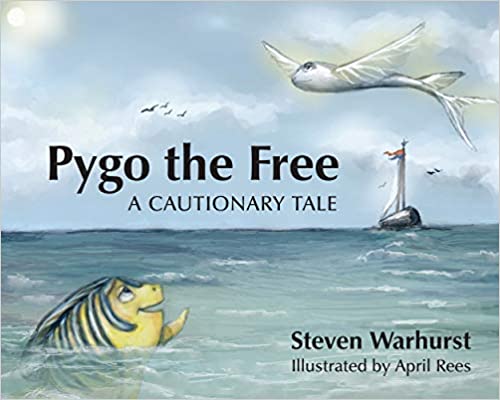A Book Review from Books At a Glance
by Kristin Stiles
What do you get when you mix Finding Nemo with 21st-century postmodern ideas? You get Pygo the Free which is indeed a cautionary tale. This picture book combines a simple ballad-type of poetry with charming pictures to get across a very important message: when we reject God’s design for our lives, the results will be disastrous.
Pygo is a spirited angelfish who bristles under the “laws of the sea.” He wants to venture out on his own and to be free. In his travels, he meets flying fish and sees sunbathers lying out on the sand. He wants the same kind of “freedom” for himself. He catches a ride on a beagle (wait for it) and ends up at the Galapagos Islands where he meets a tuna named Charles. (Are you catching the references?) Charles tells him about how fish once were able to walk on land and points out some finches to show how their beaks prove these changes. Pygo returns home with his head spinning with these new ideas. He goes off to college (“Marvard”) where these concepts are fed and enlarged. He then becomes a professor himself and continues to promote these ideas. Finally, he and his students decide to act on their beliefs and the story ends with “They swam to the shore and leapt on the beach. Thus ended Pygo the Free.”
This is such an interesting concept for a children’s book. I really appreciate that Steven Warhurst decided to tackle the issue of postmodernism and liberal education at this level. At a young age, a child can see the ridiculousness of a fish wanting to live out of the water. It makes no sense. The fish will die. Here Warhurst makes the connection between the fish and a person who wants to live apart from the laws and designs of God. It is just as ridiculous and yet it is the overwhelmingly accepted norm of our day. Parents can appreciate the references to Darwinism that show up throughout the story, and this book provides an opportunity for them to discuss the effects that secular thought has had on our society.
Warhurst uses Scripture to introduce the story and to conclude it. I was especially struck by his use of Proverbs 14:12 after the statement about Pygo’s demise: “There is a way that seems right to a man, but its end is the way to death.” Following the story, there are also discussion questions and some background notes. I think these would be very helpful in further conversations with the children after reading the book.
Our secular society and educational system want to indoctrinate our children at a young age to reject creation and the laws of God and His design for mankind. This book gives us as parents a tool to combat that at an early age and a means of starting these types of discussions. We have to be proactive and Pygo the Free assists us in doing just that.
Kristin Stiles is a home-school mom, a Sunday School teacher, and helps lead the “Young, Reading, & Reformed” children’s ministry at Reformed Baptist Church of Franconia, PA.
Buy the books

PYGO THE FREE: A CAUTIONARY TALE, by Steven Warhurst